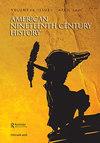The transatlantic war: Britain and the American Civil War revisited
IF 0.1
2区 历史学
Q3 HISTORY
引用次数: 0
Abstract
Readers of this journal are well aware that the study of the American Civil War has taken a global turn in the past two decades – some of them, indeed, have led the way. The internationalization of the field has been a welcome development in U.S. historiography in the twenty-first century in general and for good reason the Civil War has been at its forefront. Abraham Lincoln consistently emphasized the war’s transnational significance, of course, perhaps never more eloquently than in this famous line from his annual message to Congress in December 1862: “We shall nobly save, or meanly lose, the last best hope of earth.” At first, transnational scholarship concentrated on the ways in which the war’s politics played out on the international stage, asking an old question: what was the impact of the conflict overseas? Answers concerned previously marginalized groups and, in particular, working men seeking representative forms of governance at home. Placing secession and Confederate nation-building in comparative perspective with other separatist movements was especially popular. The field of inquiry expanded beyond narrow diplomatic channels and high politics that characterized the prior work of foreign policy historians but remained within the realm of the masculine and the political (and still does). The gaze outwards from North America also turned the other way as developments beyond U.S. borders have been shown to influence domestic history in significant ways, providing a more holistic understanding of America’s conflict. The Atlantic World features prominently in the Civil War’s global turn and there is a strong case to be made that the war had the greatest impact there. The four books under review跨大西洋战争:英国与美国内战重访
这本杂志的读者很清楚,在过去的二十年里,对美国内战的研究发生了全球性的转变,其中一些人确实起到了带头作用。这一领域的国际化在21世纪的美国史学中是一个受欢迎的发展,南北战争一直处于其前沿是有充分理由的。亚伯拉罕·林肯(Abraham Lincoln)一贯强调战争的跨国意义,当然,也许从未像1862年12月他向国会发表的年度演讲中的这句名言那样雄辩:“我们将高尚地拯救或卑鄙地失去地球上最后的希望。”,跨国学术界关注的是战争政治在国际舞台上的表现方式,提出了一个古老的问题:海外冲突的影响是什么?答案涉及以前被边缘化的群体,尤其是在国内寻求代表性治理形式的工人。将分裂国家和邦联国家建设置于与其他分裂运动的比较视角中尤其受欢迎。调查领域超越了外交政策历史学家先前工作的狭窄外交渠道和高级政治,但仍停留在男性和政治领域(现在仍然如此)。来自北美的目光也转向了另一个方向,因为美国境外的事态发展已被证明在很大程度上影响了国内历史,从而对美国的冲突有了更全面的了解。大西洋世界在南北战争的全球转折中占有突出地位,有充分的理由表明,这场战争在那里产生了最大的影响。正在复习的四本书
本文章由计算机程序翻译,如有差异,请以英文原文为准。
求助全文
约1分钟内获得全文
求助全文

 求助内容:
求助内容: 应助结果提醒方式:
应助结果提醒方式:


